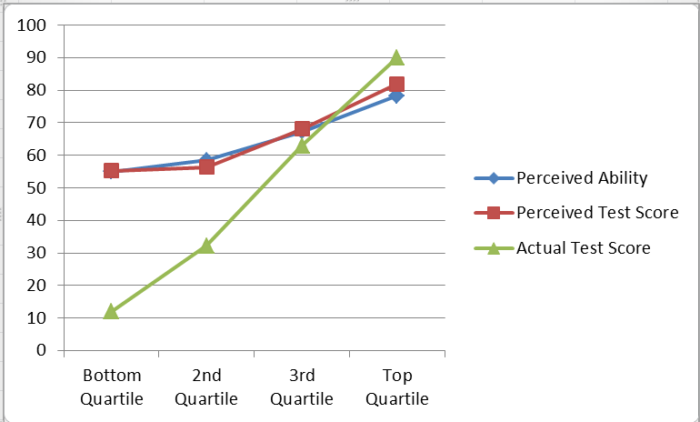Dunning–Kruger Effect is a cognitive bias in which people of low ability or skill maintain illusory superiority and mistakenly assess their ability, skill, and/or experience as greater than it is. The cognitive bias of illusory superiority comes from the inability of low-ability people to recognize their lack of ability. Without the self-awareness of metacognition (an awareness and understanding of one’s own thought processes), low-ability people cannot objectively evaluate their actual competence or incompetence.
Dunning–Kruger Effect impacts all humans and everyone (including you and me) is potentially susceptible. It has been recognized by many people over the course of human history. Dr. David Dunning and his graduate student Justin Kruger established a variety of test methodologies to measure this phenomenon and published a formal research paper about their found results.
David McRaney is the host of the excellent You Are Not So Smart podcast. He recounts when he first realized the Dunning-Kruger Effect impacted him.
I remember the first time in my life that I really recognized that [Dunning-Kruger Effect] was true.
In college, I staged a fighting game tournament where I set up all these video game systems and I invited people from around the country to the university to play. We had a group of friends – it was like, 8 to 10 people in our hometown who played this game – and we thought that we were amazing at it. We thought that we were the best in the world and I had no problem inviting the champions at this game from around the country to come to play against us.
Every single one of us lost our matches immediately. Like, we didn’t even place. We didn’t even come close. We were absolutely destroyed. And I remember all of us sort of shaking our heads and rubbing our temples and thinking, “How could we not just be not okay but actually suck? I mean, how is that possible?”
I bet that sort of thing happens a lot amongst people who are sort of at the amateur level and feel that they have achieved something.
Every human is susceptible to Dunning-Kruger Effect. The challenge is to be willing to find the means to overcome it. Because this is a cognitive bias – a mistake in reasoning, evaluating, and/or remembering – nobody can reliably do it on their own. As McRaney’s example illustrates, it was only after he and his friends organized a tournament, invited everyone that was interested and thought they were good, and measured the results did he finally snap out of his delusion of competence.
Dr. David Dunning confirms this is the path to solving Dunning-Kruger Effect.
“Why don’t people know themselves?”
You begin to realize that there are just some really big barriers to knowing yourself. That’s if you make it a private task that only you are engaged in. If you don’t talk to [and engage with] other people.
If you talk to other people, they can be sources of invaluable insight into yourself. Some of these insights may be unpleasant. Also, just watching what other people do and benchmarking what you do versus what they do can be a source of insight. It takes a village, if you will, for a person to know themselves.
We engaged in a number of studies where we exposed people to others who are performing very poorly to performing extremely well and what we find is that the collective is pretty good at knowing who’s bad.
A last hint is to ask, “Are you vaguely embarrassed by things you did 5 or 10 years ago?” And if you are, that means you’re improving. I mean, if you think about the self you were 10 years ago and you’re not embarrassed by something that you did, you might be off the task.
TL;DR
Go shoot a match or compete in something outside your unit or immediate group of friends once in a while. If you don’t, you’re almost certainly a victim of Dunning-Kruger Effect and are not able to even realize it.
Full interview with Dr. David Dunning:
YANSS Podcast 036 – Why We Are Unaware that We Lack the Skill to Tell How Unskilled and Unaware We Are

As measured ability/knowledge improves, so does the awareness and self estimate of that ability/knowledge. The top 20% will tend to underestimate their measured ability/knowledge.
It’s worth pointing out that it is wrong to believe the D-K effect applies only to people who are “incompetent.” This is wrong on two levels. The first is that the DK effect does not apply only to “incompetent people” but to everyone, with respect to any area of knowledge.
It is important to how the D-K effect is interpreted. The vast majority of people who bring it up seem to think that it applies only to dumb people and that it says dumb people think they are smarter than smart people. Neither of these things are true. Further – if you think it only applies to other people (which itself, ironically, is part of the DK effect) then you miss the core lesson and opportunity for self-improvement and critical thinking.
More:
https://theness.com/neurologicablog/index.php/misunderstanding-dunning-kruger/